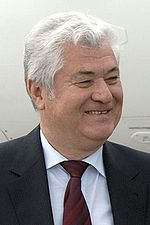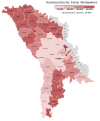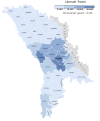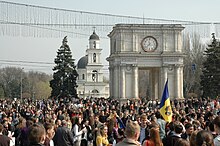General election in Moldova April 2009
The April 2009 parliamentary elections in Moldova took place on April 5, 2009.
Controversies in advance
The European Union asked the Republic of Moldova to change its electoral law before the election. This provides for a threshold clause of 6%. Electoral alliances of several parties are not permitted. Smaller western-oriented parties claim this legislation is directed against them. President Vladimir Voronin rejected the demands.
The opposition parties complained about attempts at intimidation by the judiciary and police as well as restricted access to the mass medium of television. The OSCE , which was on site with election observers, expected a more or less democratic vote. The Republic of Moldova is considered the only country in the Commonwealth of Independent States that has had relatively free elections since the collapse of the Soviet Union .
Acceding parties and candidates
The electoral commission approved 15 parties and eight independent candidates. A total of 1,183 candidates applied for the 101 parliamentary seats.
Parties and candidates (in the order determined by the electoral commission):
- Partidul Social Democrat (PSD)
- Partidul Liberal (PL)
- Alianța “Moldova Noastră” (AMN), member party of ELDR
- Partidul Popular Creștin Democrat (PPCD), member party of the EPP
- Partidul Comuniștilor din Republica Moldova (PCRM), member party of the European Left
- Partidul Liberal Democrat din Moldova (PLDM)
- Partidul Democrat din Moldova
- Uniunea Centristă din Moldova
- Mișcarea social-politică “Acțiunea Europeană”
- Partidul Dezvoltării Spirituals “Moldova Unită”
- Partidul Conservator
- Sergiu Banari (independent individual applicant)
- Ștefan Urîtu (independent individual applicant)
- Partidul Ecologist “Alianța Verde” din Moldova , member party of EGP (declared waiver of participation after approval)
- Partidul “Pentru Neam și Țară” (declared waiver of participation after admission)
- Victor Răilean (independent individual applicant)
- Uniunea Muncii “Patria-Rodina” (declared waiver of participation after admission)
- Partidul Republican din Moldova
- Tatiana Țîmbalist (independent individual applicant)
- Alexandr Lomakin (independent individual applicant)
- Valentina Cușnir (independent individual applicant, stated that she would not participate after admission)
Political mood
The political mood in the run-up to the elections was assessed as critical for the ruling communists. When they won their first election in 2001, they promised rapprochement with Russia , reunification with the separatist republic of Transnistria and an improvement in the economic and social situation. The election promises could not be kept. The economic situation was still precarious with corruption flourishing at the same time. Observers suspected that the government was trying to keep the standard of living more or less stable until the elections and expect a significant devaluation of the national currency, which has so far been artificially overvalued, for the time after the polls.
According to surveys, even if there was a sharp drop in voter approval, because of the fragmentation of the opposition and the 6% threshold, the communists would have had a chance to defend their majority in parliament:
| Party \ poll | Vox-Populi 2008 (September 2008) |
CBS-AXA (November 2008) |
|
|---|---|---|---|
| Communist Party of Moldova (PCRM) | 20.0% | 47.5% | |
| Alliance "Our Moldova" (AMN) | 8.5% | 6.8% | |
| Moldovan Liberal Democratic Party (PLDM) | 7.1% | 6.3% | |
| Liberal Party (PL) | 4.3% | 10.2% | |
| Democratic Party of Moldova (PDM) | 3.7% | 4.0% | |
| Social Democratic Party (PSD) | 3.2% | 9.3% | |
| Christian Democratic People's Party (PPCD) | 2.7% | 4.0% | |
The Vox-Populi 2008 survey also showed that over 80% of citizens were dissatisfied with their material situation. According to the results, the greatest satisfaction was found among young, well-educated city dwellers.
Procedure and evaluation by election observers
Around 2.6 million eligible voters were called to vote. In the 1977 constituencies, voting began at 7 a.m. local time ( EET ) and ended at 9 p.m. local time. Thirty-three constituencies are outside the borders of the Republic of Moldova, ten in the breakaway Republic of Transnistria , where a vote was prevented by the authorities. The election took place with the help of voting computers, which enabled the votes to be counted relatively quickly.
Election observers from various organizations, including the OSCE and the CIS, rated the elections as correct. The British MEP Emma Nicholson , who was on site for the OSCE, however, voiced suspicion that the elections had been falsified. The first count results on election night suggested a clear defeat for the ruling party. This would have been 35 percent of the vote at around 1 a.m., the opposition parties, on the other hand, 40 to 45 percent. To the astonishment of the election observer, however, a clear majority in the PCRM was determined by the election control in the morning at 8:00 a.m. Nicholson explains the positive judgment of the OSCE, among other things, with the fact that Russia is also a member of the OSCE and thus had influence on the election observation mission. The opinion of Russian election observers differed markedly from their own and that of other observers. There were also reports that the votes of those who had long since died or who were not present had been counted. According to official information, only 16,000 of the approximately one million foreign soldiers have cast their votes, of which 4,000 votes were considered invalid. The foreign Moldavian population is considered a stronghold of the opposition parties.
Official end result
| Political party | be right | Seats | ||||
|---|---|---|---|---|---|---|
| number | % | +/- | number | +/- | ||
| Communist Party of Moldova (PCRM) | 760.551 | 49.48 | +3.5 | 60 | +4 | |
| Liberal Party (PL) | 201,879 | 13.13 | +13.13 | 15th | +15 | |
| Moldovan Liberal Democratic Party (PLDM) | 191.113 | 12.43 | +12.43 | 15th | +15 | |
| Alliance "Our Moldova" (AMN) | 150.155 | 9.77 | -18.76 | 11 | -23 | |
| Social Democratic Party (PSD) | 56,866 | 3.70 | +0.78 | - | - | |
| Christian Democratic People's Party (PPCD) | 46,654 | 3.04 | -6.03 | - | –11 | |
| Democratic Party of Moldova (PDM) | 45,698 | 2.97 | +2.97 | - | - | |
| Center Union of Moldova (UCM) | 42,211 | 2.75 | +2.00 | - | - | |
| Movement "European Action" (MAE) | 15,481 | 1.01 | +1.01 | - | - | |
| Conservative Party (PC) | 4,399 | 0.29 | +0.29 | - | - | |
| Spiritual Development Party "United Moldova" (PDSMU) | 3.357 | 0.22 | +0.22 | - | - | |
| Republican Party of Moldova (PRM) | 1,436 | 0.09 | +0.05 | - | - | |
| Independent candidates | 17,287 | 1.12 | +0.18 | - | - | |
| total | 1,537,087 | 100.00 | 101 | |||
| Eligible voters | 2,704,103 | |||||
| voter turnout | 57.55% | |||||
| Votes cast | 1,556,083 | |||||
| Invalid votes | 18,996 | |||||
| Source: | ||||||
The communists initially saw a prognosis based on post-election surveys with almost 45% of the votes and thus 55 seats in parliament. The opposition parties together had 46 seats. According to the official results, contrary to the expectations of some observers, the communists were able to defend and even expand their absolute parliamentary majority. The electoral legislation benefited the ruling party insofar as the D'Hondt procedure used to determine the distribution of seats disadvantages smaller parties and at the same time a merger into electoral alliances that could have compensated for this disadvantage is no longer permitted in Moldova.
In the days after the election it looked like a three-fifths majority of the communists (61 seats) in parliament. On the evening of April 8, the electoral authorities corrected their information slightly downwards, so that the ruling party is now dependent on at least one vote from the ranks of the opposition to elect the next head of state.
While the majority of the population in the provinces supports the Communist Party, there is broad support for the opposition in the capital. This strong contrast in party-political preference as well as the deviation of the official result from the post-election survey, according to which the PCRM would have received an absolute, but not a three-fifths majority, are reasons for the dissatisfaction of the city population with the election results that took place in the week led to violent riots after the elections. There is a further contrast between the numerous foreign Moldavians living in western countries (especially in Romania), who mostly support European-oriented forces, and the citizens living in Germany. It is believed that many foreign Moldavians did not vote because of the difficult conditions and that the official result only reflects the mood among the domestic and foreign population in a distorted manner.
Voting cards
The following maps show the distribution of votes and the turnout, broken down by individual constituency, according to the official final result:
Counterfeit allegations and protests
On April 7, 2009, two days after the election, there was a mass demonstration against the ruling communists in the Moldovan capital Chișinău , the origin of which is said to be largely due to the networks of the Internet platform Twitter and less to the initiative of the opposition parties. The more than 10,000 participants accused the government of election fraud and requested that the vote be repeated. One of the protesters' leaders was the well-known Moldovan journalist Natalia Morari . Reports that she had been arrested were later denied. However, she is now said to be under house arrest. Legal action is expected to be taken against them on charges of inciting violent disturbance. Morari worked from 2002 to 2007 in Moscow for the government-critical newspaper The New Times . She became known when she was refused entry to Russia in late 2007 because of her anti- Putin activities . Following the protests, demonstrators broke into the parliament building and the presidential office, demolished office facilities and started fires. A woman was killed in the process. As later became known, a 23-year-old student also died. Family members said he was arrested and so ill-treated in police custody that he eventually died from the injuries. The authorities did not provide any information about the circumstances of death.
A day after the riots, the Moldovan government declared it suspected forces in neighboring Romania of instigating the unrest. As a consequence, it suspended visa- free entry for Romanian citizens. According to press reports, Moldovans studying in Romania were also refused entry to their home country. The Romanian ambassador was expelled and the Moldovan ambassador in Bucharest withdrawn. The Moldovan public prosecutor's office sees the Romanian-language graffiti that occurred during the riots in the stormed buildings as an indication of Romania's involvement . The Romanian flag was also hoisted on the roof after the storming of parliament .
Meanwhile, the opposition distanced itself from the rioters. On the evening of April 8, 2009, demonstrators gathered again in front of the government headquarters. They demanded the release of the 192 demonstrators arrested the previous day and threatened to storm the building. In Ukraine , at the instigation of the Moldovan government, entrepreneur Gabriel Stati , one of the richest men in Moldova, was arrested. Stati is considered to be the financier of the opposition media and the opposition Partidul Liberal . He is said to have called for the demonstration that ended in the riots. Fearing arrest, he fled across the Ukrainian border.
While the government emphasizes that it has expressly instructed the police to hold back to prevent bloodshed, opposition officials claim that the rioting crowd was deliberately allowed in to exploit the violations for propaganda purposes.
On April 10, President Voronin asked the Constitutional Court to order a recount of the votes cast in the election. Voronin's party appealed against the decision of the Central Election Commission to allow the opposition parties to view the electoral roll. Meanwhile, the Partidul Liberal , Partidul Liberal Democrat din Moldova and Alianța Moldova Noastră leaders announced new protests for Sunday April 12th. On the Friday after the ballot, the situation in the Moldovan capital calmed down for the first time since the violent protests.
Another rally took place on Saturday, April 11th, and according to various reports, 3,000 to 4,000 people attended. The leaders of the main opposition parties, Mihai Ghimpu (PL), Serafim Urecheanu (AMN) and Vlad Filat (PLDM) were also present. The Moldovan section of the human rights organization Amnesty International , meanwhile, expressed concern about the numerous arrests. According to reports, young people were arrested and taken away by plainclothes police on the streets, on public transport and during class. Many people later said they were tortured by police during interrogation. The constitutional court ordered a recount of the votes cast and a review of the electoral roll. However, the opposition refused. She saw it as an attempt to cover up an election fraud she suspected. The recount confirmed the final result previously announced. Only minor counting errors were found.
Failed election of the president

One of the first tasks of the newly elected parliament is to elect a new president. Incumbent Vladimir Voronin was not allowed to run again after two terms. His successor must be elected by June 8, 2009 with a three-fifths majority (61 of 101 votes). If no candidate reaches the required majority in three ballots or if the deadline passes without a head of state having been elected, parliament is dissolved and new elections are scheduled. The opposition parties had already announced that they would not cooperate with the communists. Since they alone do not have the necessary number of seats and are dependent on at least one vote from the ranks of the opposition, this could force new elections. Prime Minister Zinaida Greceanîi and Parliament President Marian Lupu were considered possible candidates of the PCRM for the office of President . Zinaida Greceanîi and the neurosurgeon Stanislav Groppa , member of the Academy of Sciences , were officially nominated by the PCRM . The second candidate, Stanislav Groppa, was nominated because of the legislation that does not provide for an election without an opponent.
On May 20, 2009, Prime Minister Zinaida Greceanîi stood for election to parliament as the PCRM's presidential candidate. She received the 60 votes of her party's MPs. As expected, Stanislav Groppa received no vote. Greceanîi, however, did not achieve the necessary 61 votes because the opposition parties boycotted the vote.
Another attempt to elect a head of state has been announced for June 3rd. In addition to Greceanîi, Moldova's ambassador to Russia , Andrei Neguță , was a formal candidate . As expected, this last possible election attempt also failed. The opposition again boycotted Greceanîi's election. At the last moment, the current President Vladimir Voronin tried to change the mind of the opposition parties and suggested they participate in the formation of the government, which they resolutely refused.
New elections
According to the Moldovan Constitution, after the failure of the election of a president, President Voronin was obliged to dissolve parliament and call new elections. Voronin said that he wanted to first promote the formation of a new government and only then set a date for new elections. As head of government, he proposed the incumbent and failed presidential candidate Greceanîi. The new elections in Moldova finally took place on July 29, 2009, from which the pro-Western parties emerged stronger.
Web links
- Central Electoral Commission of the Republic of Moldova Official website (Romanian, Russian)
- Parliament of the Republic of Moldova Official Website (Romanian)
- Parties and elections in Europe
- e-democracy.md
- Report on the parliamentary elections 2005 (PDF; 1017 kB)
- Violent protests in Chișinău, April 7, 2009 (Romanian)
- News overview elections in Moldova (video)
Individual evidence
- ↑ a b Results of parliamentary elections April 2009 e-democracy.md (Romanian, Russian, English)
- ↑ RFE / RL : Moldova Rejects EU Proposal To Change Election Law (English)
- ↑ a b swissinfo : Communists in Moldova clear winners according to the survey ( page no longer available , search in web archives ) Info: The link was automatically marked as defective. Please check the link according to the instructions and then remove this notice.
- ↑ Glawred : В парламентских выборах в Молдове примут участие 15 партий ( Memento of the original from March 10, 2009 in the Internet Archive ) Info: The archive link was automatically inserted and not yet checked. Please check the original and archive link according to the instructions and then remove this notice. (Russian)
- ↑ a b NEWSru.com : Молдавия в воскресенье выбирает парламент
- ↑ e-democracy.md: Alegeri parlamentare în Moldova on 5 April 2009 (Romanian)
- ^ Spiegel Online : Republic of Moldova - Last oasis for Soviet nostalgics
- ↑ suite101.com: Moldova's Parliamentary Election 2009 Preview (English)
- ↑ Unimedia : Moldova merge într-o direcţie greşită, arată un nou sondaj de opinie publică ( Memento of the original of April 10, 2009 in the Internet Archive ) Info: The archive link was inserted automatically and has not yet been checked. Please check the original and archive link according to the instructions and then remove this notice. (Romanian)
- ↑ a b NEWSru.com: На Украине задержан молдавский бизнесмен, которого Кишинев обвиняет в организации госперер
- ↑ BBC News : Romania blamed over Moldova riots
- ↑ a b DW-World.de : Republic of Moldova: No solution in sight
- ↑ e-democracy.md: Rezultatele sondajului la ieşirea de la urne Exit Poll
- ↑ a b NZZ online: Moldova corrects the election result
- ↑ a b NEWSru.com: Молдавская прокуратура: в кишиневских беспорядках четко виден румынский след
- ↑ a b c NZZ online: Twitter of dissatisfaction in the Republic of Moldova
- ↑ HotNews.ro : Chisinau, ciocniri intre cei 30,000 de manifestanti si politie. Cladirea Parlamentului e in flacari (videos, Romanian)
- ↑ IA Novosti Moldova: Журналистка Морарь не подозревается в причастности к беспорядкам - генпрокурор Молдавии ( Memento of the original on 12 April 2009 at the Internet Archive ) Info: The archive link is automatically inserted and not yet tested. Please check the original and archive link according to the instructions and then remove this notice.
- ↑ NEWSru.com: МВД Молдавии: журналистка Наталья Морарь задержана как организатор акций протеста в Кишиневе (Russian)
- ↑ NZZ online : Unrest in the Moldau aren
- ^ Welt Online : Crisis in Moldova. Protester dies after violent protests
- ↑ a b NZZ online: Again protests in Moldova
- ↑ NEWSru.com: Кишинев отозвал посла из Бухареста: беспорядки могли спровоцировать румыны (Russian)
- ↑ NEWSru.com: Митингующие в Кишиневе грозят ворваться в здание правительства, где идет заседание с участием президента (Russian)
- ↑ NEWSru.com: Президент Молдавии просит пересчитать голоса на выборах, спровоцировавших беспорядки
- ↑ NEWSru.com: В Кишиневе три оппозиционные партии вновь намерены провести акцию протеста
- ↑ BBC News: Moldova court orders poll recount
- ^ Reuters UK : Communists to win Moldova vote but short of seats
- ^ ORF.at : Moldova: Communists defend power
- ↑ Moldova azi: Greceanii and Groppa registered as candidates for presidency
- ↑ standard.at : Opposition lets presidential election fail for the time being
- ↑ KP.MD : Андрей Негуца стал вторым кандидатом на пост президента
- ↑ a b NEWSru.com : В Молдавии оппозиция второй раз сорвала выборы президента. Теперь будут распускать парламент









